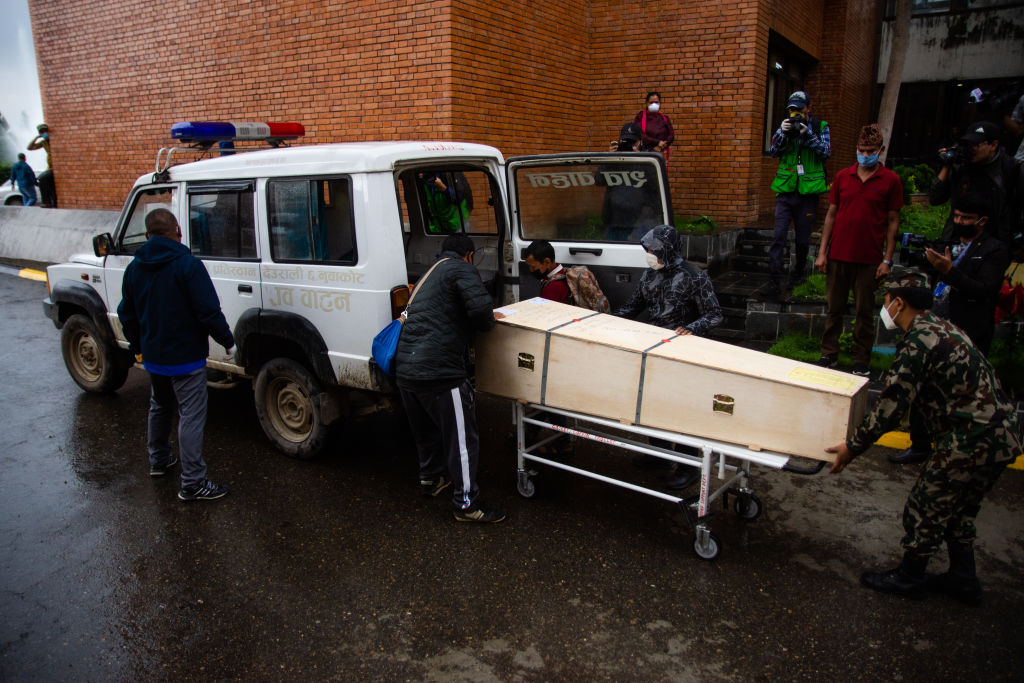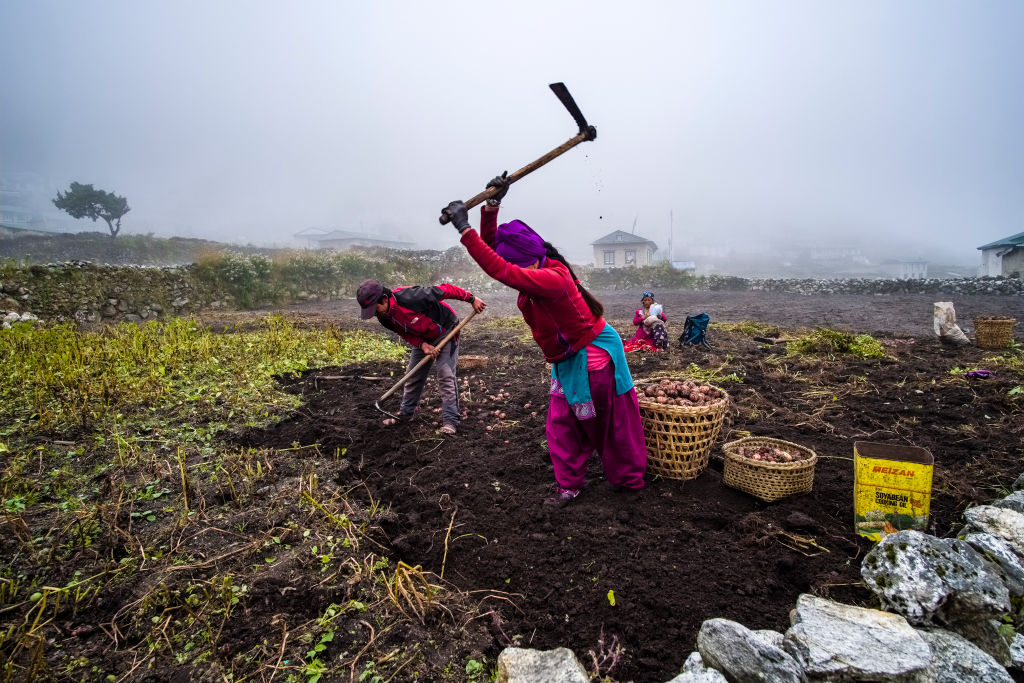KATHMANDU, Nepal—Around half the world’s population is expected to watch the 2022 FIFA World Cup final, but Sirmita Pasi won’t be among them.
Her husband, Ramsagar Pasi, departed for Qatar two years ago, tired of not finding employment in Banke, a mostly rural area in western Nepal. He was leaving to become a construction worker on soccer stadiums for the World Cup, she said, and made two promises. On his return, he’d upgrade their house, which was made of hay, mud, and wood; and he’d provide a quality education for their two children.
Instead, he came back this April in a coffin. He’s one of 6,500 South Asian migrant workers a Guardian investigation estimates died due to unexplained circumstances after working long hours in extreme heat in Qatar, in the decade since the country won the right to host FIFA’s flagship tournament.
In almost all cases, their death certificates list cause of death as natural, unknown, cardiac failure, or respiratory failure. A World Health Organization expert called these descriptions “meaningless,” as they don’t explain what caused the cardiac or respiratory failures.
Pasi said she was told her husband died from a heart attack. She couldn’t believe it, even when she saw the 32-year-old’s body arrive at their courtyard.
“He was so young, so healthy,” Pasi said, who assumed more than $5,000 in debt from her late husband.
The most controversial World Cup in recent memory is now drawing to a close. Despite high-profile campaigns by human rights and LGBTQ groups, the event has delivered record viewership numbers for FIFA and the Qatari government is considering a bid for the Olympics. As the world moves on, widows like Pasi are left picking up the pieces of their shattered lives.
In Nepal, Bangladesh, India, and elsewhere in South Asia, these women bear what sociologists call the “triple burden”—taking on their husbands’ share of child care and housework as well as becoming the primary income earner. In South Asia, they also have to cope with the social stigma of being a widow, lack of agency, and conflicts with relatives over their husband’s assets. Widows who are immigrants also have difficulties obtaining official documentation of the death of their spouse.
But one of the biggest headaches for widows is debt, with most migrants borrowing heavily from local money lenders at high interest rates to fund their move abroad. Responsibility for the loans is passed on to their wives after their deaths, and now, thousands of widows across the subcontinent are saddled with thousands of dollars in debt.
“I have so many problems, not just one or two,” Pasi said. “How to earn, how to get food, how to raise my children.”
“How are you watching this”?
Namrata Raju, India director at Equidem
In Nepal, the government disburses compensation of about $5,000 to the families of dead migrants. Rights groups said this accomplishes little more than covering the debt the workers typically take on to go abroad.
Compensation schemes tend to be run on shoestring budgets where they do exist. Bangladesh’s program is funded by the government and also offers a modest $5,000. In India, which has experienced the highest number of deaths, states like Kerala with large numbers of migrants abroad offer a similar amount in compensation. Nepal’s fund is financed by the workers themselves, who contribute about $30 each before they leave the country.
#PayUpFIFA, a campaign of unions, fan groups, and advocacy organizations led by Amnesty International and Human Rights Watch, is calling for FIFA and the government of Qatar to step in and provide $440 million in compensation to workers who’ve been exploited or injured and to the family members of those who’ve died.
The government of Qatar has said 400 to 500 workers have died. They argue the number of deaths is not unusual considering there are 2 million migrants in the country, making up an estimated 95 percent of the labor force.
But campaigners said the numbers are indeed stark given most migrants are young and able-bodied and that the government’s estimate excludes thousands of deaths due to unexplained causes.
“In a well-resourced health care system, less than 1 percent of deaths should be effectively unexplained,” said Ella Knight, a researcher on migrant labor rights at Amnesty International. “Some of the data we’ve looked at out of Bangladesh shows that 70 percent of migrant deaths [in Qatar] were unexplained.”

The amount the campaign is demanding is equivalent to the total prize money for the tournament. It’s received an ambivalent response from FIFA, which said it is willing to engage in continued dialogue. The demand has been laughed off by the Qatari government, whose labor minister called it a “publicity stunt.”
The death of yet another migrant worker during the group stages of the tournament—a Filipino man who fell while performing repairs at a FIFA training base—provoked some reflection but not the kind campaigners were hoping for. Upon hearing about the accident, Qatar’s World Cup chief, Nasser al-Khater, observed: “Death is a natural part of life, whether it’s at work, whether it’s in your sleep.”
Namrata Raju, India director at Equidem, one of the groups taking part in the #PayUpFIFA campaign, said a major obstacle in gathering support is that Qatar has business ties with most countries in the world—and so does FIFA.
“It’s a crisis of conscience,” she said. “This is a global labor question. Because how can a labor market like this exist in a modern era? Why should any country or any company be premised on modern-day slavery? It’s a question for every single football fan around the world. How are you watching this?”
Problems That Keep Compounding
Worried about the quality of the public education system in Nepal, the Pasi family had enrolled their two children in a private school with the expectation that Ramsagar’s income in Qatar would pay for it. Now, Pasi said she’ll be forced to pull her kids out of the school because they don’t have enough money for the next academic session’s tuition, which begins in April.
So many widows are in deep financial trouble after their husbands died in the Persian Gulf that researchers said they’ve discovered lenders exploiting their sense of vulnerability.
Lekh Nath Paudel, a doctoral fellow at the University of Lausanne researching families of Nepali migrant workers, said financial institutions, such as microfinance organizations, tell women they could lose everything if their husbands die abroad, and they convince them to invest remittances into projects, such as small farms, that are often connected to those financial institutions.

“The fear of the death of migrant workers and the fear of injuries to migrant workers is being used as a tool to do emotional blackmail,” Paudel said. “Instead of leading to prosperity as promised, you’re more indebted because the money you’ve been sending back has been put into a particular enterprise, and often, the investment doesn’t work out. This triggers another round of migration.”
The loss of a husband can also be the loss of an important ally. Many women in South Asia, especially poor women like the wives of migrant workers in the Gulf, live with their in-laws. If their husbands die, then they have very little clout in conflicts with their in-laws over land, assets, and any compensation they might receive as a result of the death.
“Most widows are facing the problem of being denied any rights to property if they don’t do as the father-in-law or mother-in-law wishes,” said Sanju Jaiswal, who said her husband died in Qatar while working there as a food delivery worker.
Mohna Ansari, a former member of Nepal’s National Human Rights Commission, said this problem is especially acute in the southern parts of Madhesh, which borders India and is Nepal’s smallest and most populous province, home to 6.1 million people of the roughly 30.4 million people in the country.
Many of the widows of migrant workers in that area come from across the border in India. Ansari said these women frequently don’t have citizenship papers or even marriage certificates, as in-laws hold off on getting these documents registered to maintain leverage over them.
“The in-laws are often suspicious that if they get the legal documents made, the wife will take control of the money or property and run away,” Ansari said. “She’s never seen as a full family member.”
In these circumstances, “the wife never gets the compensation—never,” she added.
Rubi Khatun, a widow in Madhesh province who is originally from India, said she still doesn’t have Nepali citizenship even though she was married to a Nepali man for 13 years. She said her husband was always working abroad and was never present in the country long enough for them to process their official documents.
Two years ago, she said her 30-year-old husband returned from Qatar suffering from kidney problems and died soon after.
“After he died, I went to Kathmandu to claim compensation from the [government’s] foreign employment board,” Khatun said. “But I couldn’t get anything because of my citizenship.”
Khatun said the failed trip to Kathmandu cost her 50,000 rupees (or $384)—more than six times the $61 monthly salary she makes as a hotel cleaner raising two children by herself.
Although the compensation amount being demanded by the #PayUpFIFA campaign was chosen for its symbolic value, if it is successful, then it could have a concrete impact on the lives of indebted widows. In Pasi’s case, her husband originally borrowed about $1,400 (or 180,000 Nepali rupees) to pay recruiters to find him a job in Qatar. But the first job didn’t work out, and he had to take out more loans to find another gig.
With 36 percent annual interest compounding these loans, she said the total owed has become more than $5,000. Pasi, a day laborer who earns $3 to $4 per day on other people’s farms, is now responsible for this amount.
“The money was taken from local money lenders,” she said. “The interest keeps multiplying every year. Money lenders keep coming to my home. They ask, ‘Give me money.’ Since we have problems even managing food, how can we settle loans? I’m really in a helpless situation.”
Maher Sattar is a Senior Editor at The Fuller Project (in New York).
Bhadra Sharma is a freelance journalist (in Kathmandu, who has written frequently for The New York Times and the Kathmandu Post)


 Bhadra Sharma
Bhadra Sharma
